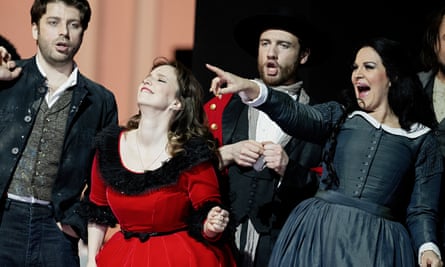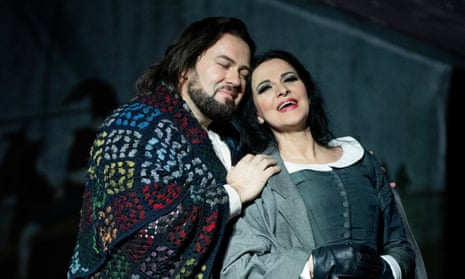The centenary of Puccini’s death falls later this year, and the Royal Opera has effectively opened the commemorations and tributes with a big revival, the fourth , of Richard Jones’s 2017 staging of La Bohème. There are three casts, of which this was the second: the performance also marked the return of Angela Gheorghiu to the role of Mimì, with which she launched her international career when she first it sang at Covent Garden in 1992.
As one might expect, she was cheered on by fans, then greeted with a rapturous ovation as she took her curtain call. It must also be acknowledged, however, that her voice and artistry are no longer quite what they were. The dark, liquid tone that used to be so striking, is now only intermittently in evidence. There was some wayward intonation, particularly at the start, and Mi chiamano Mimì, taken with almost tentative slowness, seemed underpowered, the great phrases of the central section not really flowing as they should. The later acts were more secure without equalling the intensity she once brought to them: her death scene, though, was admirably unsentimental and touchingly done.

There are fine performances elsewhere. Stefan Pop makes an ardent, virile-sounding Rodolfo with an easy ring in his upper registers and a marvellous way with the text: you can hear every word, and hear it given meaning, which is relatively rare these days. Simona Mihai and Andrey Zhilikhovsky, one of today’s best young baritones, are marvellous as Musetta and Marcello, sounding glorious and wonderfully moving in the way they suggest the deep and genuine love that lurks behind the couple’s on-off sparring. Zoltan Nagy is the camp, witty Schaunard, Michael Mofidian the bluff yet tender Colline. Evelino Pidò, one of the run’s two conductors, dials the tempi down for Gheorghiu’s numbers, but is pleasingly urgent elsewhere. There was however too much imprecise stage/pit coordination on this occasion, although the playing was lovely.
Jones’s staging, for the most part, is sparse and austere, if non-naturalistic, with the bohemians cramped into a dingy, barely furnished attic, seemingly with only one mattress between them. The second act, however, is swamped in tech, as Stewart Laing’s constantly moving set whirls us through the streets and arcades of Paris, and there’s a major distraction in the third when the tavern at the Barrière d’Enfer unaccountably begins to move across the stage. This not the best Bohème you will see or hear, in short, though Pop, Zhilikhovsky and Mihai make it more than worthwhile. And Gheorghiu’s admirers will doubtless be glad to see their diva back on stage.

Comments (…)
Sign in or create your Guardian account to join the discussion